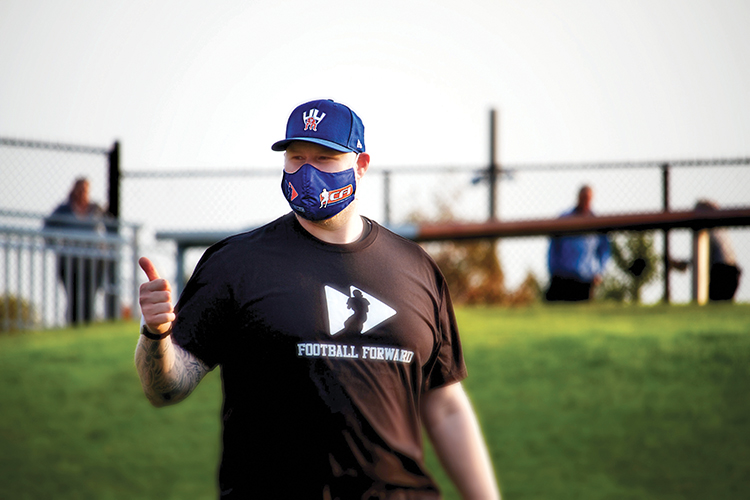His life had spiraled out of control.
In 1997, over the course of six months, Brock Flemming ’01 went from a twice-a-week, after-school football player to one of the most desired offensive line prospects in Canada. He committed to the University of Michigan, the school with the most all-time wins in college football history and a pipeline to the pros. Many marked him as a future NFL star.
But, he backed out of his commitment to Michigan. Coming from a regular, middle-class family, Flemming didn’t know how to navigate the world of high-level athletics. And, the thought of competing for a highly ranked team so far from home was daunting. “It was overwhelming [to make that decision] without having any preparation,” he reflects.
Now, at 42, he still sometimes feels the familiar ache of regret. He could’ve been the one people watched play professionally, like his childhood friend Jesse Palmer. So, to turn those thoughts into positive ones, he’s working to make sure today’s gifted athletes are ready.
On weekends during football season, the 6’7″ blonde makes his way around the University of Ottawa’s dome, teaching the next generation of college and professional athletes how to be physically and mentally prepared for the challenges they’ll face. As founder of the Canadian Football Institute (CFI), Flemming is using his experiences and football know-how to help accelerate his students’ careers. “[If I hadn’t made my mistakes,] I wouldn’t have understood some of the struggles that they’d be going through, especially from a mental standpoint,” he says.
In an average season, 150–200 high-achieving players in the Ottawa area attend the CFI for tailored workouts, extra coaching, and a strong community. They also get advice from mentors, like Flemming, on how to accelerate their careers after middle and high school.
To be able to help future college and professional football players achieve their potential is a role that inspires him every time he steps on the field. In a way, Flemming says, he’s finally getting his do-over.
But the path to that do-over wasn’t without its trials.
His last year at Colgate — the school he chose over Michigan for its tight-knit feel and closer proximity to home — Flemming suffered an injury and had to sit out the season. He felt tired and overwhelmed with football. With guidance and care from his support system, including then head trainer Marty Erb and Dr. Merrill Miller, director of Student Health Services, Flemming earned an educational studies degree. He also felt support through the camaraderie of his teammates and Delta Upsilon brothers.
After graduating, Flemming played Canadian rules football at the University
of Ottawa. His talent was apparent, and soon he was named the No. 1 tackle in the country, which earned him a stint in the Canadian Football League (CFL). However, the low income and on-the-road lifestyle made him yearn for home. So, he left the sport.
Coming to terms with the fact that he wouldn’t play football professionally again, he began to wish that someone had told him how to navigate the football world — from being recruited at the high school level to playing for the NFL. And then it hit him: He could be that person to the next generation of football players.
Outside of his day job as a procurement manager for the Canadian government, he started organizing a free combine, so any players who had the ability to compete could do so. One of the first athletes he tested and identified was a 14-year-old Neville Gallimore — whom you may have seen on TV recently, playing for the Dallas Cowboys. That combine morphed into what is now the CFI, and it continues to grow.
“You have to have your super vision,” he says. For Flemming, that dream involves expanding the 12-year-old organization. Its nonprofit wing, Football Forward, launched in early 2021 with a $40,000 grant. “We never let a kid’s finances dictate whether or not they can train with us,” Flemming says. “You put the effort in, we’ll let you do it.” He’s also adding an academic component, so he can ensure his players have degrees alongside their trophies.
“It’s funny how good things come back when you’re doing good things,” he says.
One of Flemming’s Canadian Football Institute students was Colgate defensive back Arthur Hamlin ’23.

